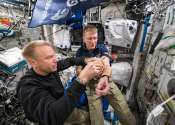Studying the world's largest T. rex to learn about evolution
Scotty, the world's largest T. rex, has captured the public's attention since it was discovered in Saskatchewan in 1991. Now, researchers from the University of Regina (UofR) and the Royal Saskatchewan Museum (RSM) are taking ...









